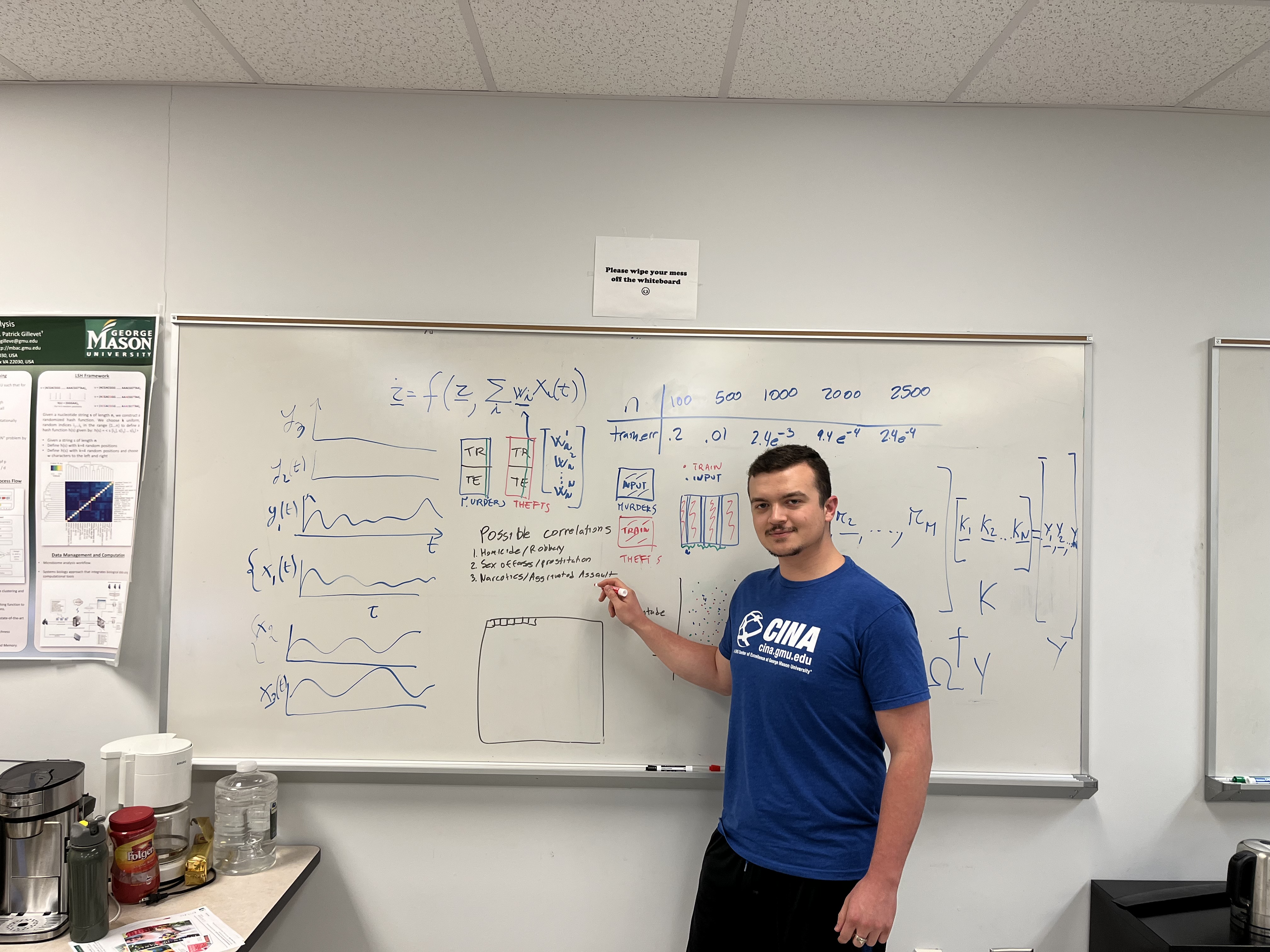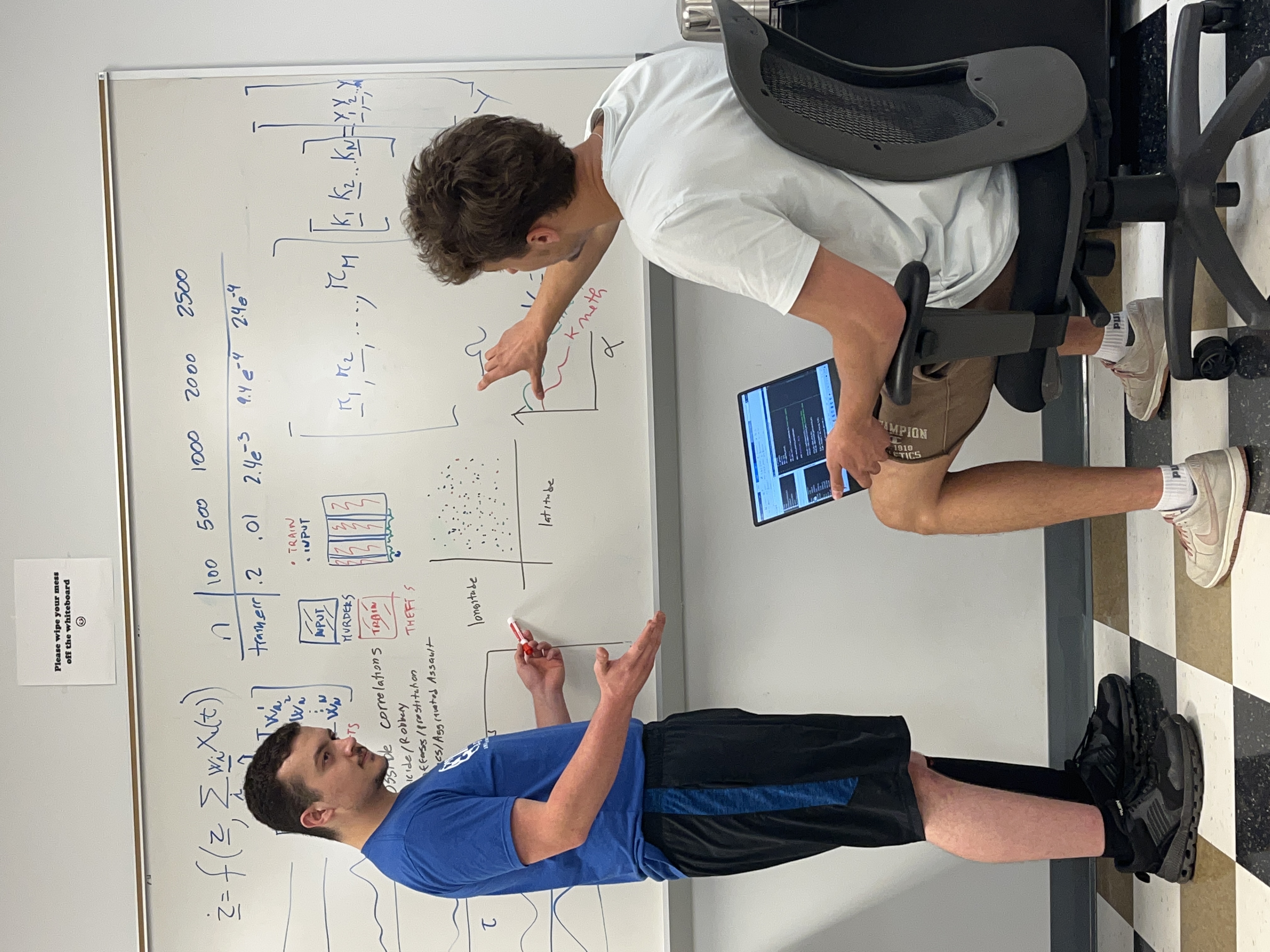Recent News
New director will enhance interdisciplinary engineering learning opportunities
July 2, 2025
Final SIRI cohort visits UNM campus
June 30, 2025
Perfetti receives ANS Landis Engineering Achievement Award
June 26, 2025
Engineering a new treatment for ovarian cancer
June 24, 2025
News Archives
UNM student spends summer at Department of Homeland Security internship to develop tool to predict crime
August 1, 2023 - By Kim Delker

James Gentry shows off some of the UNM group's work at George Mason University's CINA.
Thanks to taking a chance on an opportunity he never dreamed he’d have, a School of Engineering student spent the summer at an internship at George Mason University developing a software tool that uses artificial intelligence to model and predict criminal activity.
The findings could help law enforcement and investigators at all levels project when and where crimes are likely to occur.
James Gentry, a junior in mechanical engineering at UNM, along with Younes Slaoui, an undergraduate computer science student at UNM, worked with Francesco Sorrentino, professor of mechanical engineering, at the internship with the Department of Homeland Security (DHS) Criminal Investigation and Network Analysis (CINA) division, a DHS Center of Excellence led by George Mason University.
Their mission sounds simple, yet is complex.
“We are developing tools for the Department of Homeland Security to track and predict criminal activity,” he said.
Gentry said that the applications of the software they have been working on, if successful, could be used to combat common and perplexing crimes for law enforcement, including fighting the fentanyl crisis, human trafficking, drug smuggling, shoplifting rings and other networked illicit operations across the country.
The project required them first to find a data set for the program to “learn” through machine learning. That involved diving into crime data in the Washington, D.C., area. They found a good set of publicly available 2015-2019 data to work with and based much of their machine learning processes on that.
The team developed what they call “observer code,” where they feed data into the program, then it is tasked with making estimated guesses about past events based on the patterns it detects. Inputs include the locations and day of the year where each crime took place. They did this for nine different crimes, and based on the correlation between different crimes, could give estimates of when and where crimes are likely to have occurred.
For instance, they could feed the algorithm 365 days of theft data and 200 days of homicide data, and the program would look at the correlation between thefts and homicides and determine where officers should look for the past 165 days of homicides.
“The observer code can be used for any series of incidents in any part of the country,” Gentry said, which makes it a tool with great potential and flexibility.
He is currently working on code to predict future crime incidences to give law enforcement a head start on stopping crime before it starts. He calls this program the “predictor code,” which relies on similar principles as the observer code but can be used for events that haven’t happened yet. This is useful for law enforcement as they can mobilize and centralize a limited police force around a problem area at a given time to maximize their effectiveness in stopping crimes, drug crossings and illicit activity.
The project involved coding in MATLAB, a language that Gentry was previously not that familiar with beyond the introductory class he took at UNM.
“I’ve learned how useful MATLAB can be,” he said. “I actually hated coding before this, so it was surprising to learn all that MATLAB could do. I’ve gotten to see the inner workings of MATLAB, and I can use this knowledge in other applications in the future.”
Gentry said he has enjoyed living and working near the nation’s capital, and even aspires to work in the government in the future. After all, it runs in his family.

Gentry and Younes Slaoui discuss their software project.
“My grandfather was a captain in the Vietnam War and was later in the FBI,” he said. “Government work has always really interested me. There is a lot of defense industry based in New Mexico, so this internship seemed like a great opportunity to get experience.”
Gentry, originally from Ventura County, Calif., chose UNM because of its reputation of having a solid engineering program, as well as the opportunity to live outside of California. He said that UNM has been a good choice for him to study engineering because it’s offered him a variety of opportunities he might not have had otherwise.
He said it was only due to an email from the Engineering Student Success Center this spring that he learned about the internship in the first place. Although he wasn’t sure he had a chance, he applied anyway and learned he’d been selected in May, giving him only a few weeks to prepare to move across the country for the summer.
“This experience has been great and has allowed me to experience a different culture,” he said. “I spent the Fourth of July watching fireworks on the steps of the Lincoln Memorial.”
He also enjoyed visiting the memorials at the Pentagon and the Air Force.
And in addition to getting the opportunity to work with faculty advisor Sorrentino, the internship allowed Gentry to make some useful connections in the career field he hopes to join one day.
“I participated in MSI Week [CINA Minority Serving Institutions Summer Week] from the Department of Homeland Security, I’ve gotten to talk with and listen to former FBI interrogators and members of the DHS,” he said. “It’s been a really cool experience.”
